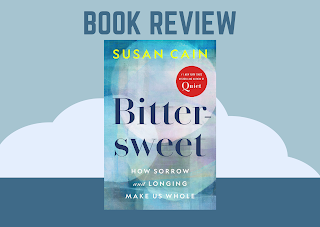Book Review - Bittersweet by Susan Cain
Bittersweet: How Sorrow and Longing Can Make Us Whole by Susan Cain is my first foray into Cain’s world of nonfiction. A cross between a self-help book and a deep examination of life a la Gawande’s Being Mortal, Bittersweet is a fascinating albeit terse look at what it means to experience longing in wholly new ways.
Unlike other nonfiction texts, Bittersweet begins with a reflection of you. And for me, this is one of Cain's specialties. She has a way of making it feel like the text is specifically about you. But Cain throws herself at this examination of self-help examining life, death, religion, spirituality and even a visit to an immortalists conference. Each one of these moments offers a glimpse to a world that is both completely unfamiliar and yet strangely intimate. In many ways, each one of these vignettes could be a book all its own. But because we merely visit these moments, the profundity here is often lacking. It often feels like we move onto the next chapter just as you’re investing into the current scenario. What we end up with feels like a great talking point for a book club, but at that club would we really talk about the text or ourselves? Definitely ourselves. Which is Susan Cain’s goal here. Bittersweet begs to be discussed. That said, I wish the text spent a little more time with some of these moments because they’re worthy of exploration.
But even if these moments are brief, the true hindrance of the text is it’s too self referential. She points out that she is indeed an author who is writing a book about sadness and sorrow with a bit too much frequency. It made me wonder if we were visiting with care or if we were voyeurs into experiences we shouldn’t know about. I don’t deny that Cain’s intentions were good, but at times, it feels less noble than it could. This is all the more apparent as she seemingly creates distance between herself and how the situations in the text connect to her own life. Her father’s and brother’s death are mentioned with such brevity, it’s almost a wonder she mentions them at all. There is no sense of gravitas of these seemingly monumental moments. They’re also shockingly currently (Covid related deaths), but Covid is barely mentioned. And while I understand authors wanting to avoid the dreaded “C” word, in a text like this, it feels like a major missed opportunity.
The true shining moments of Bittersweet involve the visit to the aforementioned immortalists conference and a chapter about violinist turned author Min Kym and a stolen violin. These chapters layer connections in a spiral, not settling on binary or simple solutions. What you’re left with is a sense of a reality much bigger than our understanding–a world too expansive and nearly sublime, and it’s at these moments that Cain’s Bittersweet coalesces into something grander, even while other chapters can’t quite manage these heights.
I should make it super clear, I really enjoyed my time in Bittersweet. It gave me plenty of moments throughout my day to pause and reflect; that said, for a book that talks about sadness as a whole, I don’t know if at the end of the text I felt a sense of completion. For all the dabbles in sadness, the lack of polarity with the sanguine is a notable omission. Ultimately, if you’ve been deemed the “old soul” or “too introspective” or find yourself deeply moved or even inspired by sadness, then Bittersweet might begin to peel the layers for you to understand why. Just don’t expect to come to any major revelations.
Bittersweet: How Sorrow and Longing Make Us Whole
Release date: April 5th, 2022
MSRP: $14.00

.png)
.png)
.png)
Comments
Post a Comment